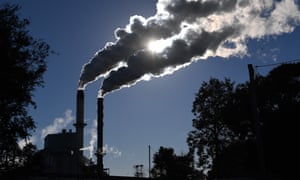Extract from The Guardian
Emissions projections report shows Scott Morrison’s claims Australia will meet obligations under Paris agreement are incorrect
Australia will miss its 2030 emissions reduction targets, despite
Scott Morrison’s claim the country is on track to meet its obligations
“in a canter”, new government projections show.
The government published its 2018 emissions projections report on Friday, just before Christmas, in its now customary style of releasing greenhouse data just before a public holiday.
The report details how Australia is tracking towards its 2020 and 2030 emissions reduction obligations under the Paris and Kyoto agreements.
It projects total emissions in 2030 will be 563 million tonnes of
carbon dioxide equivalent, which is an emissions reduction of 7% on 2005
levels.The government published its 2018 emissions projections report on Friday, just before Christmas, in its now customary style of releasing greenhouse data just before a public holiday.
The report details how Australia is tracking towards its 2020 and 2030 emissions reduction obligations under the Paris and Kyoto agreements.
Australia’s targets under the Paris agreement are for a 26% to 28% emissions reduction on 2005 levels.
The report projects emissions from all sectors, except for electricity, waste and land use, will grow by 2030.
It forecasts electricity emissions will fall to 2023 before starting to increase again.
The government’s emissions calculations for 2030 also appear to suggest it intends to used carryover from overachievement of previous Kyoto targets to try to meet its Paris obligations, unless this is opposed through UN negotiations.
Climate scientist and the chief executive of Climate Analytics, Bill Hare, said use of carryover would effectively mean the target Australia was aiming for was “more like 12% to 14%” on 2005 levels by 2030.
“They’re as far away as ever from meeting the 2030 target,” he said. “The underlying projections show a substantial deterioration because the key sectors including direct combustion of fuel, transport and industry have larger increases than last year and the power sector begins increasing again from 2023 significantly.”
The report says Australia will beat its 2020 emissions reduction target of 5% on 2005 levels.
It says Australia will “overachieve” on the target by 367 million tonnes of carbon dioxide equivalent, if carryover from beating the first Kyoto target in 2012 – which allowed Australia to increase its emissions from 1990 levels – is included.
If carryover is not included, Australia would beat the target by 240 million tonnes.
In a statement released with the report on Friday, the environment minister, Melissa Price, focused on Australia’s progress towards the 2020 target, describing it as “a great result for the environment”.
She said “we have also made significant progress to our 2030 target”.
“We have overachieved on our 2020 target and are well on our way to meeting our commitment to the Paris agreement 2030 target, all while maintaining a strong economy,” she said.
Scientists and environment groups said it was clearly not the case that Australia was making progress towards 2030.
The Australian Conservation Foundation said the government had no policy to address Australia’s climate pollution problem.
“Prime Minister Scott Morrison has repeatedly said Australia will meet its Paris agreement targets in a canter, but the government’s own emissions projections tell a very different story,” the ACF’s economics program manager, Matt Rose, said.
“The prime minister is not the only one having trouble accepting that Australia isn’t on track to meet our Paris target.
“Energy minister Angus Taylor released a misleading statement this week titled, ‘National Electricity Market emissions to hit Paris target eight years early’, and on Radio National Breakfast tried to pretend Australia’s Paris target would be met by reductions in the electricity sector alone.”
Emma Herd, the chief executive of the Investor Group on Climate Change, said Australia “remains off track to achieve our currently inadequate 2030 target and, critically, achieving net zero emissions by 2050”.
She said the longer the country delayed taking credible action, the harder the economic adjustment would be and Australia risked losing the benefits of investment in clean energy and other low carbon opportunities.
Herd said the suggestion in the report Australia might try to use carryover was concerning and “undermines the investment needed to transform the economy to net zero emissions”.
“Australia’s targets should be strengthened, not weakened, by 2020,” she said. “To secure the long-term prosperity of Australia, targets need to be in line with the objectives of the Paris agreement – limiting warming to 1.5C and well below 2C.”
The Greens’ climate spokesman, Adam Bandt, said the government was resorting to “accounting tricks” to try to meet its Paris target.
“So far the government’s only plan to meet Paris appears to be using dodgy accounting to cook the books and count dodgy ‘carryover’ credits from Kyoto towards Paris,” he said. “Other major countries such as the United Kingdom and Germany voluntarily cancelled their Kyoto carryover credits.”
Morrison disputed in a statement issued on Friday that the government was not on track to beat the 2030 target.

No comments:
Post a Comment